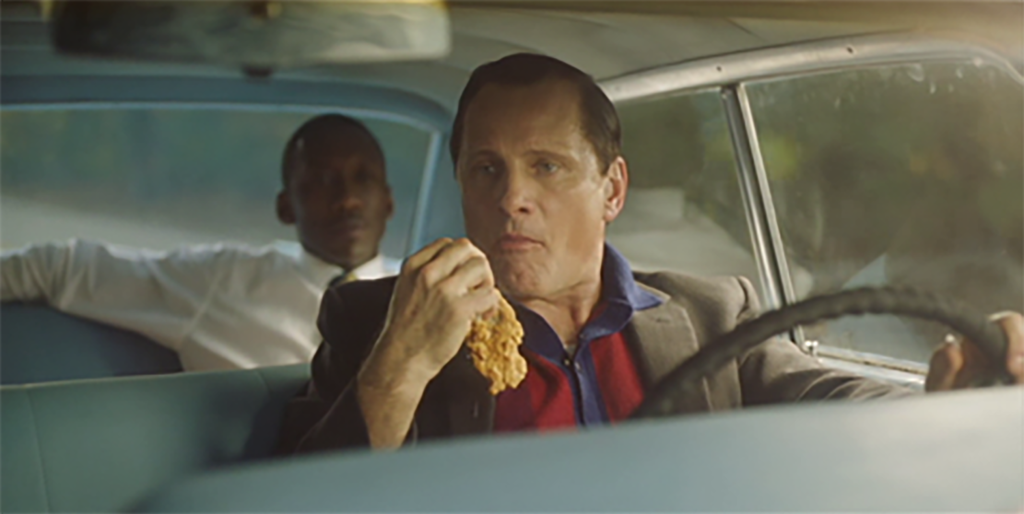
Film Matters: Please tell us about your article that is being published in Film Matters.
Hannah Vliet: “White Saviors Get Gold Trophies: Colorblind Racism and Film Award Culture” analyzes the cultural “text” of Green Book’s Best Picture acceptance speech at the 2019 Academy Awards to expose the neoliberal, colorblind mode of racism that infects the Academy of Motion Picture Arts and Sciences, as well as the American film industry at large.
FM: What research and/or methodologies do you incorporate in your article?
HV: I did a lot of research for this essay. Some of my references include film and cultural theorists like Jean-Louis Comolli, Jean Narboni, Ta-Nehisi Coates, and Stuart Hall, magazine opinion pieces (e.g., “Who Was Green Book For?” from Vulture), and hard data about Oscars viewership, Academy demographics, film box office success, etc. This laid the foundation for me to dissect the insidious nature of Green Book’s Best Picture acceptance speech and overall award success.
FM: Describe the original context for/when writing this article while an undergraduate student.
HV: I actually wrote the piece for a freshman honors seminar about the cultural phenomenon of colorblind racism—not a film class. However, I was taking my first film classes at the same time and knew I wanted to write about colorblind racism through the lens of something film-related. At the time, Green Book—a movie I despised—had recently won an Academy Award, but many people online had already written brilliant critiques about the film. So, I pivoted to writing about film award culture and the film industry instead.
FM: How have your personal experiences shaped and influenced your writing?
HV: I think being an actor has made me aware of how my writing sounds. I like writing that has rhythm and vibrancy, so I try to incorporate that into even my more academic writing, when possible. Beyond that, my lived experience as someone other than a straight, white man obviously makes its way into my critical perspective of the world and the cinema.
FM: What aspects of the writing process were most challenging? Why?
HV: For this essay, the biggest challenge was balancing the amount of research and film theory necessary for supporting my thesis with language that is accessible. I don’t want my writing to be unintelligible to someone outside of cinema studies, but I also want it to be interesting and precise.
FM: What do you enjoy most about your article?
HV: I think my writing often possesses a clear, strong voice (perhaps sometimes a bit too strong). I like that I can recognize such in the article, and that I am able to use my voice to write about that which I feel passionately.
FM: How has the Film Matters editorial and publication process impacted the development/evolution of your article?
HV: Knowing my article was going to be published forced me to read and edit the piece through the lens of a reader who is not my professor, friend, or self. This was exciting and scary, but I feel confident that the changes I made serve the article.
FM: What audience do you hope to reach with your Film Matters article and/or what impact do you hope it has on the field of film studies?
HV: I hope my article reaches other undergraduate film students. I love reading the work of my peers, so hopefully I can contribute something worthwhile to that sphere.
FM: How has your department and/or institution supported your work in film and media?
HV: The Rutgers Cinema Studies program has countless professors who have supported and enriched my studies. David Fresko, Sandy Flitterman-Lewis, Al Nigrin, Meheli Sen, and more have all challenged me and made me a better writer and thinker. Beyond the department, I have had many other great professors who better me and my work, including Stephane Robolin, who helped me conceptualize the original draft of this essay.
FM: How has your faculty mentor fostered your advancement as a film scholar?
HV: As I mentioned in an earlier question, I wrote the original draft of this essay for an honors seminar that was not about cinema at all. I did so after an introductory film class with Fresko, my faculty mentor, during my freshman year, as I was eager to write about film whenever I could. Still, I did not submit this essay to Film Matters until my junior year. After several more classes with Fresko, I was exposed to many different schools of film theory, challenging yet brilliant film writing, lively classroom discourse, and helpful feedback on my own work. With this new skill set at my disposal, I heavily revised the piece and transformed it into its current version. I am very grateful for the help which Fresko, and all of my other film and arts professors, have generously offered.
FM: What advice do you have for undergraduate film and media scholars?
HV: Write about films and topics that you actually care about. Passion and perspective are the most electric parts of writing and those which I first recognize as a reader.
FM: What are your future plans?
HV: Currently, my main goals are to complete my senior honors thesis and graduate in the spring of 2022. We’ll see what comes after that; hopefully, more writing and creative work.
Author Biography
Hannah Vliet is currently an Honors College Scholar at Rutgers University, pursuing degrees in Theatre Arts and Cinema Studies, and a minor in Creative Writing. Her other recent writing includes film reviews for the New Jersey International Film Festival and short plays for Stream On! Productions and Cabaret Theater.




































